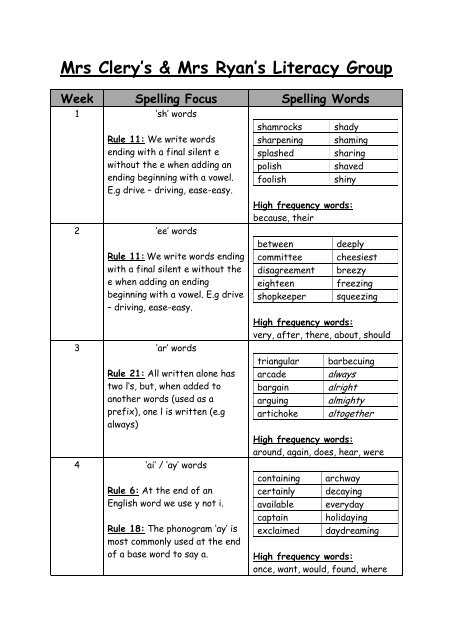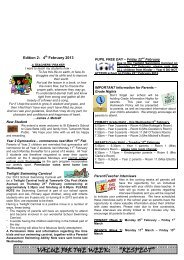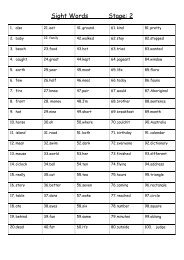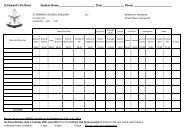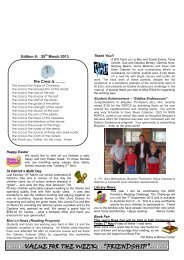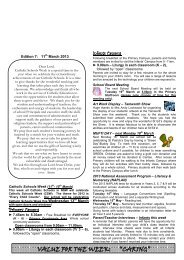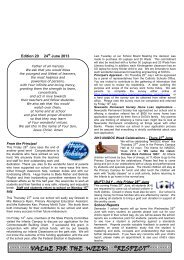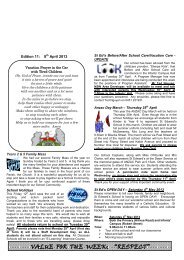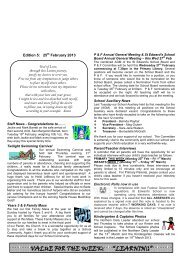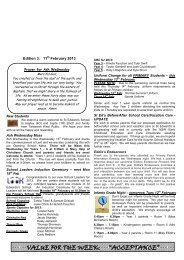Spelling List, Spelling Rules & High Frequency Words
Spelling List, Spelling Rules & High Frequency Words
Spelling List, Spelling Rules & High Frequency Words
You also want an ePaper? Increase the reach of your titles
YUMPU automatically turns print PDFs into web optimized ePapers that Google loves.
Mrs Clery’s & Mrs Ryan’s Literacy Group<br />
Week <strong>Spelling</strong> Focus <strong>Spelling</strong> <strong>Words</strong><br />
1 ‘sh’ words<br />
Rule 11: We write words<br />
ending with a final silent e<br />
without the e when adding an<br />
ending beginning with a vowel.<br />
E.g drive – driving, ease-easy.<br />
shamrocks<br />
sharpening<br />
splashed<br />
polish<br />
foolish<br />
shady<br />
shaming<br />
sharing<br />
shaved<br />
shiny<br />
2 ‘ee’ words<br />
Rule 11: We write words ending<br />
with a final silent e without the<br />
e when adding an ending<br />
beginning with a vowel. E.g drive<br />
– driving, ease-easy.<br />
3 ‘ar’ words<br />
Rule 21: All written alone has<br />
two l’s, but, when added to<br />
another words (used as a<br />
prefix), one l is written (e.g<br />
always)<br />
4 ‘ai’ / ‘ay’ words<br />
Rule 6: At the end of an<br />
English word we use y not i.<br />
Rule 18: The phonogram ‘ay’ is<br />
most commonly used at the end<br />
of a base word to say a.<br />
<strong>High</strong> frequency words:<br />
because, their<br />
between<br />
committee<br />
disagreement<br />
eighteen<br />
shopkeeper<br />
deeply<br />
cheesiest<br />
breezy<br />
freezing<br />
squeezing<br />
<strong>High</strong> frequency words:<br />
very, after, there, about, should<br />
triangular<br />
arcade<br />
bargain<br />
arguing<br />
artichoke<br />
barbecuing<br />
always<br />
alright<br />
almighty<br />
altogether<br />
<strong>High</strong> frequency words:<br />
around, again, does, hear, were<br />
containing<br />
certainly<br />
available<br />
captain<br />
exclaimed<br />
archway<br />
decaying<br />
everyday<br />
holidaying<br />
daydreaming<br />
<strong>High</strong> frequency words:<br />
once, want, would, found, where
5 ‘oi’ / ‘oy’ words<br />
Rule 6: At the end of an English<br />
word we use y not i.<br />
avoided<br />
choice<br />
noisiest<br />
ointment<br />
poisonous<br />
annoying<br />
destroyed<br />
enjoyment<br />
foyer<br />
oyster<br />
6 ‘aw’ / ‘au’ words<br />
Rule 9: In a one syllable word<br />
with one vowel followed by one<br />
consonant, we write another<br />
consonant before adding an<br />
ending beginning with a vowel.<br />
The letter x is an exception<br />
because it already has 2 sounds<br />
– ks.<br />
7 ‘or’ words<br />
Rule 9: In a one syllable word<br />
with one vowel followed by one<br />
consonant, we write another<br />
consonant before adding an<br />
ending beginning with a vowel.<br />
The letter x is an exception<br />
because it already has 2 sounds<br />
– ks.<br />
8 ‘ck’ words<br />
Rule 25: We may only use the<br />
phonogram ck after a vowel<br />
saying short a, e, i, o, u (black,<br />
wreck, click, flock, stuck)<br />
<strong>High</strong> frequency words:<br />
people, another, two, too, use<br />
awesome<br />
chainsaws<br />
crawling<br />
strawberries<br />
yawning<br />
swapped<br />
reddish<br />
astronaut<br />
audience<br />
audition<br />
paused<br />
daughter<br />
bigger<br />
getting<br />
<strong>High</strong> frequency words:<br />
because, caught, they’re, two,<br />
Australia<br />
Aboriginal<br />
adored<br />
gorgeous<br />
border<br />
decorations<br />
exploring<br />
boxing<br />
foxes<br />
waxing<br />
fixed<br />
<strong>High</strong> frequency words:<br />
people, along, saw, was, one, just,<br />
this<br />
aftershock<br />
rucksack<br />
broomstick<br />
shipwreck<br />
matchsticks<br />
padlock<br />
wreckage<br />
clicked<br />
black<br />
yuck<br />
<strong>High</strong> frequency words:<br />
left, took, find, caused
9 ‘dge’ words<br />
Rule 23: We may only use the<br />
phonogram dge after a vowel<br />
saying short a, e, i, o, u (badge,<br />
hedge, ridge, dodge, judge)<br />
acknowledge<br />
grudge<br />
nudged<br />
porridge<br />
smudges<br />
trudged<br />
dodged<br />
judge<br />
badges<br />
hedge<br />
<strong>High</strong> frequency words:<br />
children, losing, past, their, other


